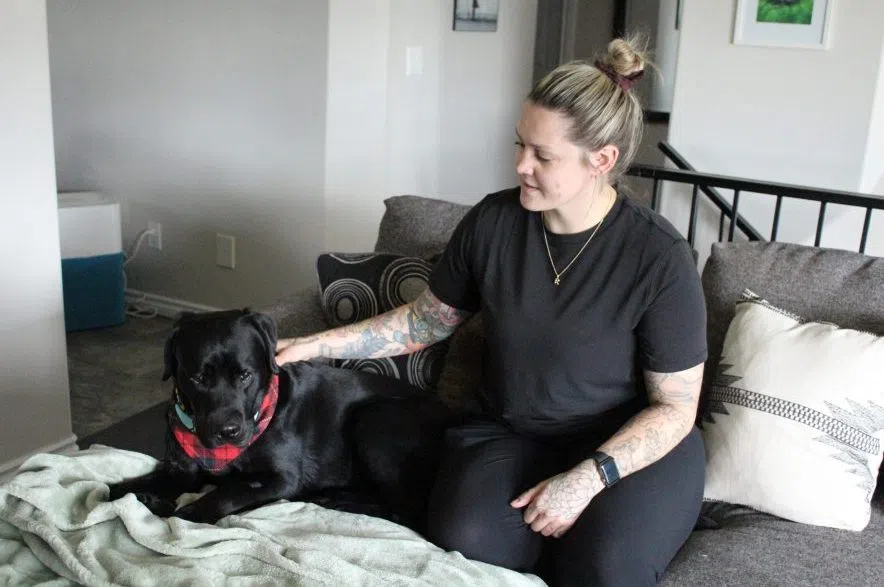Most mornings used to start the same way for Rhianna Kaminski: struggling to get out of bed, weighed down by the heaviness of PTSD and anxiety.
Then came Sully.
Read More:
- From plates to pendants: Saskatchewan artist makes jewelry from dishes
- Large and in charge: What it takes to eat like the Riders’ O-line
- Buzzing with wisdom: Five life lessons from a Sask. beekeeper dad
A sleek black lab with sharp instincts and a soft heart, Sully isn’t just her companion — he’s her psychiatric service dog, trained to guide her through moments of panic, disassociation or emotional overload.
Listen to the story on Behind the Headlines:
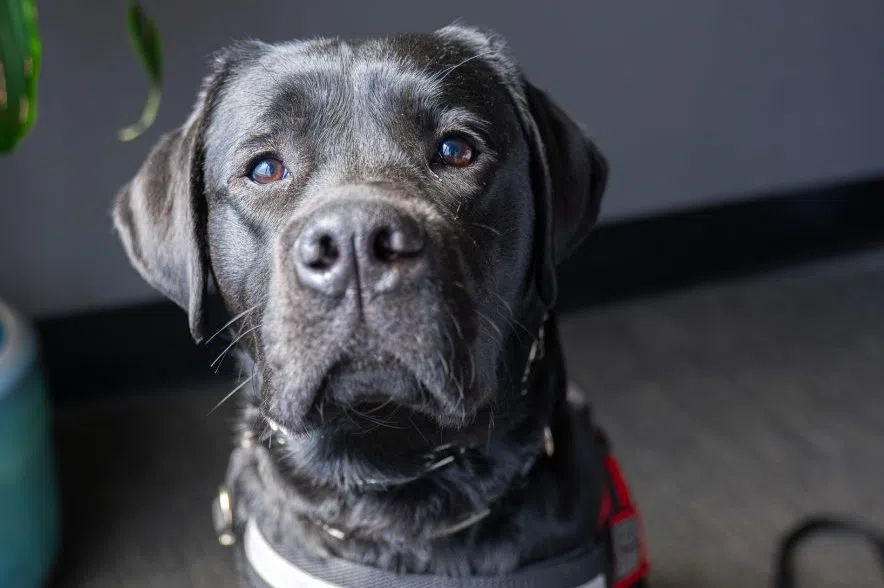
Behind every psychiatric service dog are years of careful training, tailoring skills that can cost tens of thousands of dollars. (Submitted)
“There was a time where I was having to cancel my first couple clients because I could not get out of bed,” Kaminski, a registered massage therapist, said. “Now it’s a lot less likely… He’s there, forcing me to get up.”
Kaminski has been working with Sully since he was just a few weeks old through a Saskatoon-based nonprofit called Sunshine Service Dogs, an organization that specializes in psychiatric support animals and provides training at no cost to the handler.
The impact on Kaminski’s life has been profound.
“It’s impacted me in such a beautiful, positive way,” she said. “He helps me regulate myself, which then, in turn, makes me more able to go and be a productive member of society.”
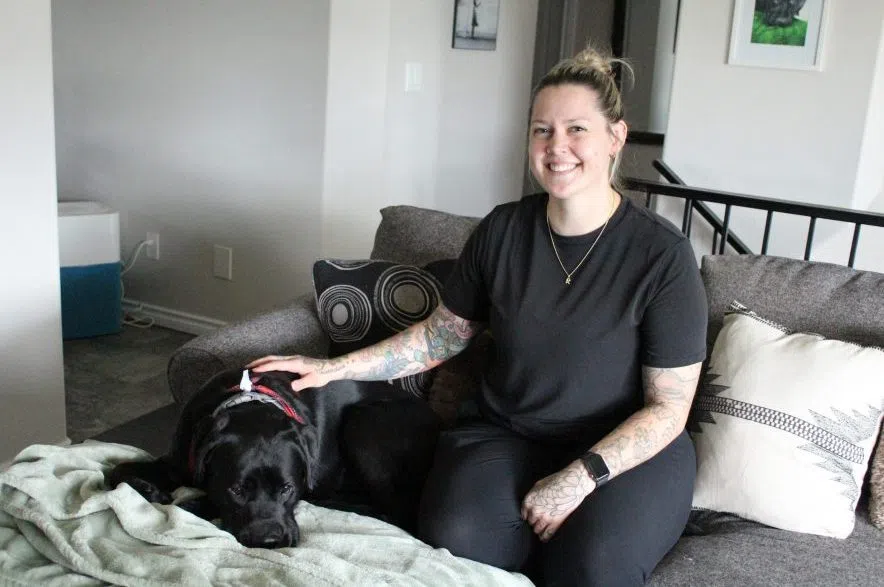
In peaceful moments at home, Kaminski and Sully share a quiet connection — a reminder that healing isn’t always about action, but about presence, trust and unconditional support. (Brittany Caffet/650 CKOM)
The heart behind the hounds
Sunshine Service Dogs was founded by Conrad Keller, a longtime dog trainer who originally planned to pursue a career in clinical psychology.
“I decided I wanted to be a clinical psychologist… but I realized that dogs are just a lot more of my passion,” he said, seated on a worn couch inside his Saskatoon dog daycare, The Hound Lounge, where the nonprofit was born.
His beagle, Delilah, sleeps beside him while a blur of shepherds, retrievers and rescues thunder past in happy chaos.
“When I first started dog training, I didn’t have a direction,” Keller said. “The service dogs kind of just fell into my lap. I fell in love with it.”
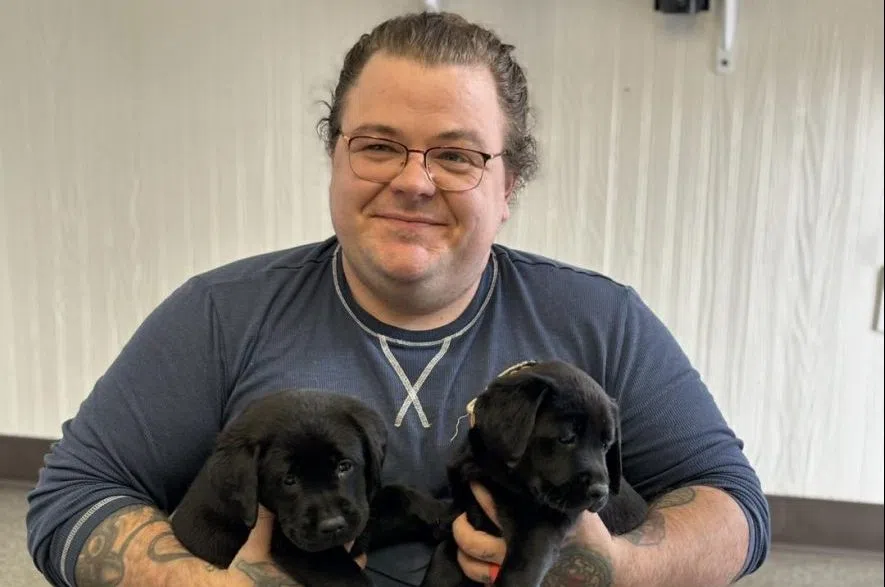
Conrad Keller’s lifelong passion for dogs and psychology comes alive in these early moments — picking puppies destined to become life-changing companions for those battling invisible illnesses. (Sunshine Service Dogs/Facebook)
Backed by years of hands-on experience and a background in psychology, Keller saw a gap in support for people living with invisible illnesses — particularly those with PTSD, OCD, anxiety and depression. Sunshine Service Dogs took shape in 2022 to help meet that need.
“We focus specifically on psychiatric service dogs,” he said. “There’s very little public funding. Service dogs can cost upwards of $30,000… So we made it a charity. That way we could try to break that financial barrier.”
How to get a service dog from Sunshine
“First things first,” Keller said, “I require that people get a letter from a mental health professional stating that a psychiatric service dog would benefit them. That’s the starting point.”
From there, applicants go through a multi-step interview process to ensure the program is a good fit for both the person and the dog.
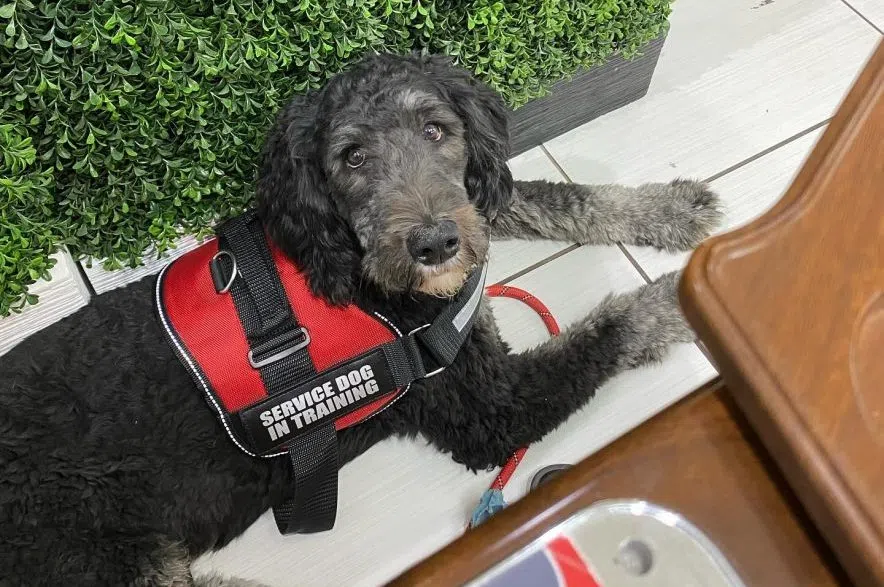
These dogs learn to sense distress long before their handlers do, performing tasks that can interrupt panic, retrieve medication or guide their person away from stressful situations. (Sunshine Service Dogs/Facebook)
The first interview is a one-on-one conversation with Keller, focused on understanding the applicant’s mental health needs, lifestyle and goals. The second includes family members or a support network to make sure the household is prepared for the responsibility.
“The third is a home visit,” Keller said. “We want to see how everyone interacts, and what kind of environment the dog will be living in.”
After those initial steps, the final decision goes to Sunshine’s board of directors.
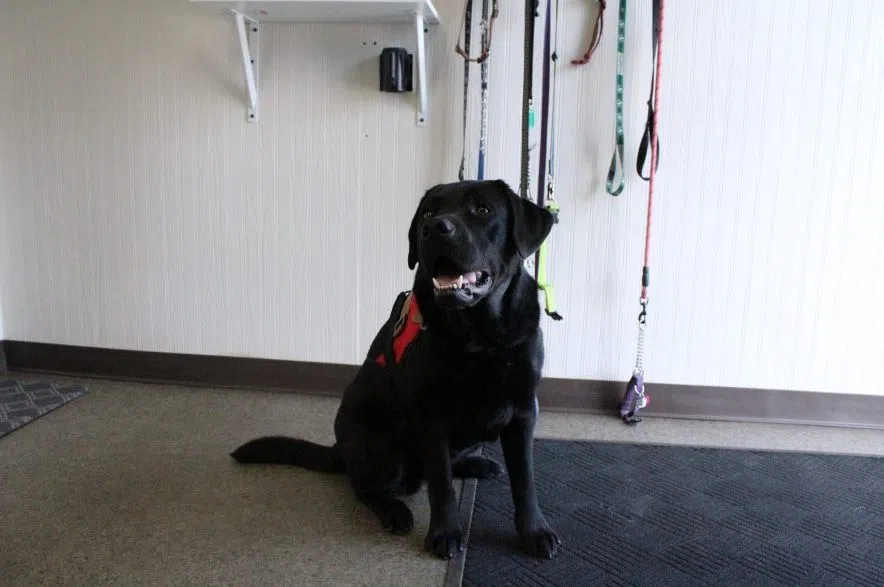
Rip is a two-year-old psychiatric service dog trained through Sunshine Service Dogs. He’s been expertly taught to recognize signs of emotional distress and provide crucial support. (Brittany Caffet/650 CKOM)
“We all come to an agreement on whether this is something that will be beneficial to them, and whether it’s something I can realistically support as a trainer,” Keller explained.
If approved, the wait begins — but it’s worth it.
Keller works with a trusted breeder who helps identify puppies with the right temperament for psychiatric service work. Once a suitable match is found, the puppy is placed with the handler at around eight weeks old, and training begins.
That entire process comes at no cost to the handler.
“It’s just a matter of picking the right puppy for them,” Keller said. “That can take three months, six months, a year or more, depending on what’s needed. But once they’re approved, the dog is free.”
Puppy prep school: Building bonds from day one
Unlike many service dog programs, Sunshine Service Dogs doesn’t train the dogs in isolation and then hand them off. Instead, the future handler is involved from the very beginning.
“We start our puppies from eight weeks,” Keller said, “and the handler is involved from day one.”
For Kaminski, that bond-building process was vital.
“Sully was literally picked from the litter for me, specifically, with all my needs,” she recalled.
Sunshine handlers take part in weekly group lessons, private training sessions and regular outings.
“Sully comes to work with me every day,” Kaminski said. “He’s working more than a full-time job… he easily puts in 40 hours a week.”
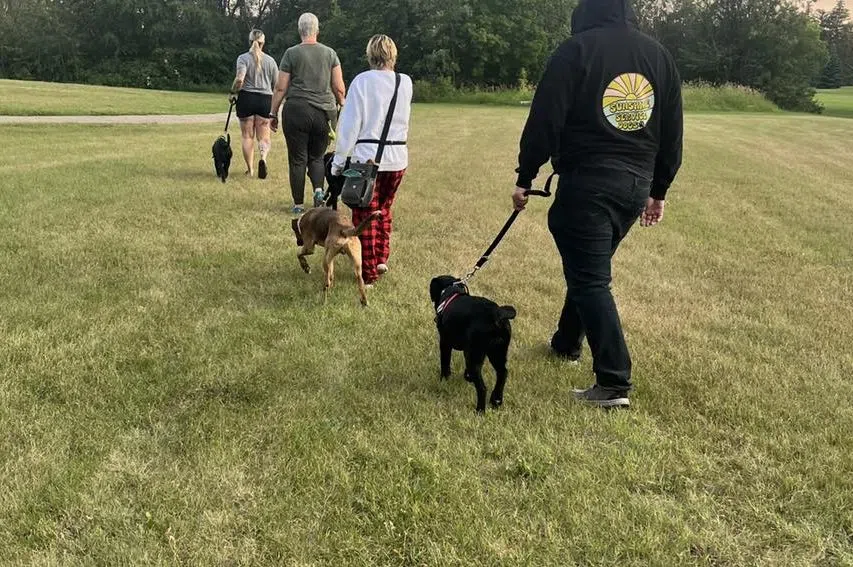
Each week, Sunshine Service Dogs’ handlers come together to learn, support and grow alongside their service dogs. This rigorous training is about more than obedience — it’s building a life-changing partnership. (Sunshine Service Dogs/Facebook)
This early and ongoing involvement creates a deep emotional bond — and a more finely tuned working partnership. Of course, that also means navigating the puppy years.
“He’ll go out in public, and he’s perfect. Everyone’s like, ‘Oh, he’s so wonderful!’ But then I get home, and he’s a feral little guy running around,” Kaminski laughed. “People forget, he’s still a dog. He still has to be a puppy.”
The work they do
Psychiatric service dogs are trained to recognize signs of emotional distress and perform specific tasks to help their handler regulate and recover. These tasks can include behavior interruption, medication retrieval, “grounding” techniques like deep pressure therapy and crowd exit cues.
“If I’m somewhere and I start getting really overwhelmed… I say ‘Exit,’ and his job is to get me out of there,” Kaminski explained. “He also does deep pressure therapy — he’ll just come and lay right on me and provide that pressure to ground me and bring down my heart rate.”
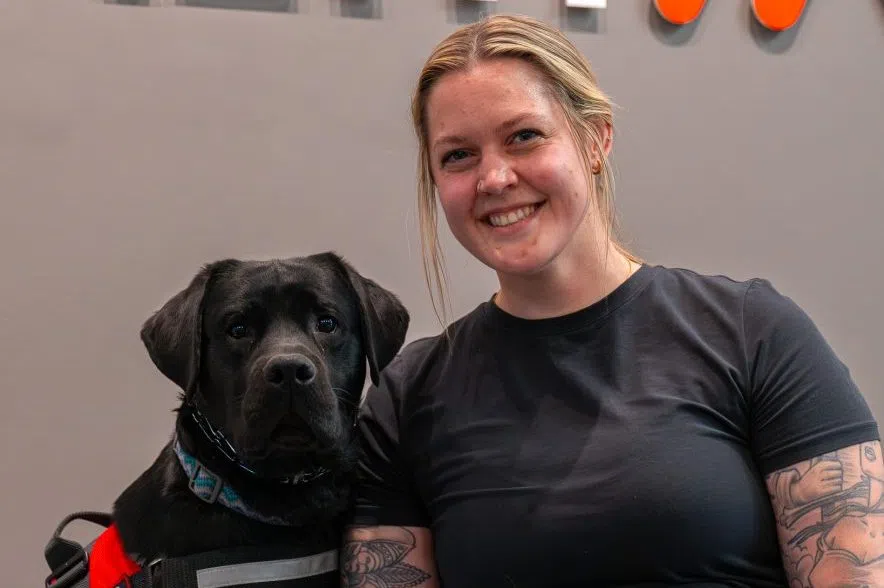
At her workplace, Kaminski and Sully work as a seamless team. His quiet presence offers her the calm and confidence to focus on her clients, even on days shadowed by anxiety. (Submitted)
It’s a subtle but powerful form of support. Sometimes the dog simply being present is enough to create a sense of safety — and to signal to others that support may be needed.
“It’s almost given me the freedom to be a little bit more open with my symptoms and what’s happening with me, because people can see it,” Kaminski said.
“My dog is sitting there alerting me, and I’m like, ‘Oh, you’re right. I am really anxious right now.’”
Breaking down stigma
One of the biggest challenges Kaminski faces isn’t in training — it’s in public perception. Because her disability isn’t visible, people often question her need for a service dog.
“I present as a very able-bodied person,” she said. “People ask if I’m training him for someone else. And I’m like, ‘No, he’s for me.’ That opens the door to, ‘Well, what’s wrong with you?’”
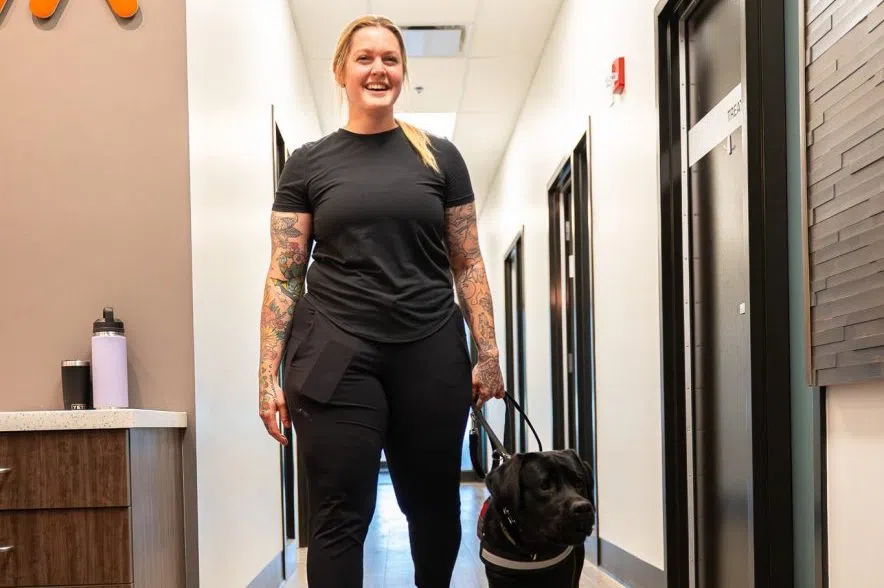
Rhianna Kaminski’s life changed when she was matched with Sully, a psychiatric service dog trained through the nonprofit Sunshine Service Dogs. With Sully’s support, she’s able to manage her PTSD and anxiety, empowering her to do the work she loves as a massage therapist. (Submitted)
Kaminski said she sees those conversations as an opportunity to change how people think about disabilities.
“He gives me the ability to go places and feel a little bit more comfortable and relaxed,” she said. “I struggle in social situations. I struggle in large crowds. So for him to be able to come along with me is absolutely incredible.”
Look, don’t touch: Respecting dogs on duty
In Saskatchewan, there’s no legal requirement for a service dog to wear identifying gear — something Keller says should change.
“I think that’s crazy,” he said. “Your dog should have a service vest… It says ‘service dog’ or ‘service dog in training’ right on both sides. That’s the minimum — letting people know the dog exists, but they need to ignore it.”
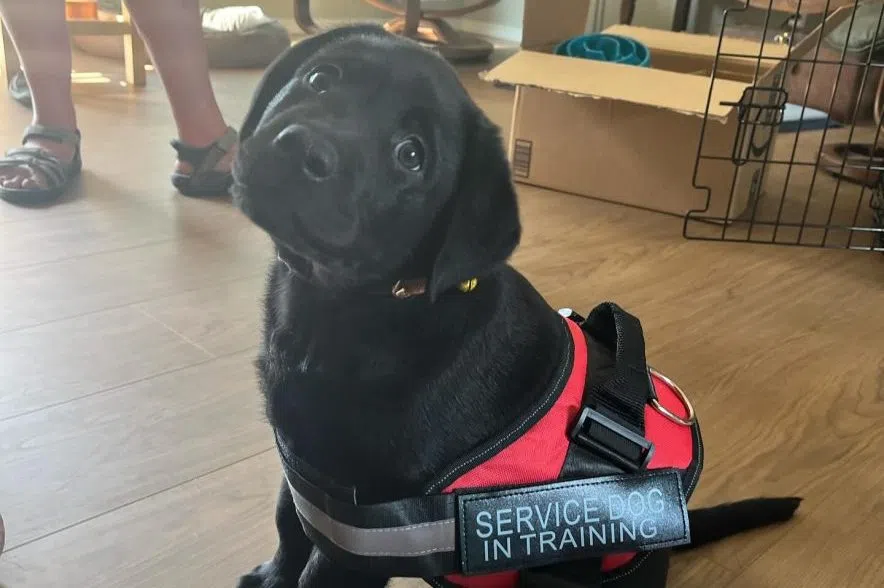
Even as a tiny pup, this future service dog wears their vest with purpose — the first step in a journey that will train them to be a steadfast partner through life’s toughest moments. (Sunshine Service Dogs/Facebook)
Kaminski agrees. When Sully wears his vest, he knows it’s time to work — and the public needs to understand that as well.
“You wouldn’t go up to somebody in a wheelchair and start touching their chair,” she said. “Don’t make eye contact, don’t talk to the dog — come directly to the handler if you want to ask something. But remember, this is a piece of medical equipment. Nobody owes you an explanation.”
A priceless partnership
Training a psychiatric service dog can cost between $20,000 and $40,000 — a number far out of reach for most people.
“The fact that he has removed the barriers… is absolutely incredible,” Kaminski said of Keller. “I know how fortunate I am to be a part of it. This is going to be a $40,000 dog by the time all of our training is done — and that’s not something I take lightly.”
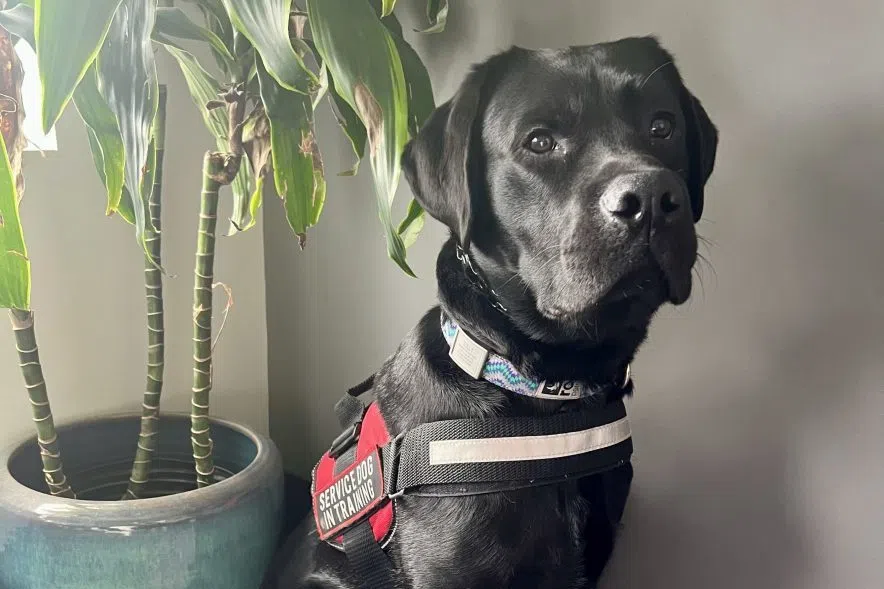
Nestled in the corner of the massage room, Sully is more than a companion. He’s a source of calm and strength, quietly supporting Kaminski through every session. (Submitted)
While Sully is still in training, the transformation is already clear.
“He empowers me with more of a sense of freedom,” Kaminski said. “He gives me the ability to function in the world again.”
The nonprofit is still in the early stages, with its first group of puppies approaching certification age.
“Our puppies are learning, our handlers are learning, and we’re all growing together,” Keller said with a proud smile.
Sunshine Service Dogs is offering something rare: a chance at a brighter, more connected life, one helping hand — and four helping paws — at a time.
